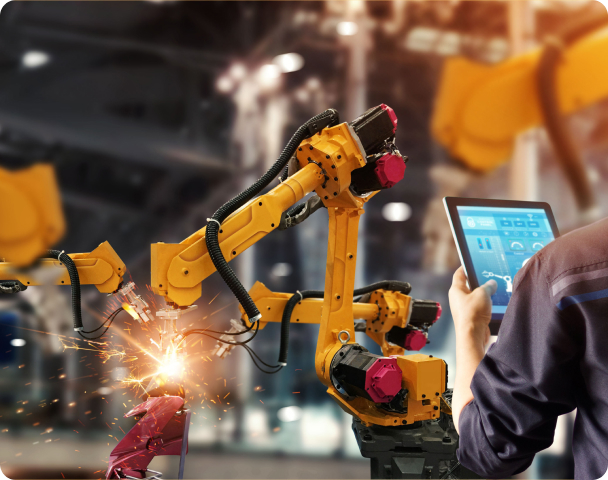The role of IIoT platforms in digital transformation of the industrial sector
The role of Industrial IoT (IIoT) in manufacturing is growing and, naturally, IoT platforms from major vendors become more specialized in industrial use cases. As a result, such platforms are now frequently referred to as IIoT platforms, especially if IIoT is their single pivotal domain like in the case with industrial giants that have entered the IoT platform market with their home-made offerings.
But how big a role do such platforms play in IIoT adoption for manufacturers? In their recent report on IIoT platforms, McKinsey gives a thorough analysis of this question. We present some key takeaways to bring you up to speed.
IIoT platforms enable valuable integration between IT and OT
Information technology has been extensively used to automate back office operations, such as finance, resource planning, accounting, etc. Yet today a truly digital enterprise should leverage technology to improve their core line-of-business operations as well. In the industrial sector, this includes manufacturing, supply chain management, maintenance, product design, and customer service. In doing so, industrial companies can achieve integrated automation across their production facilities, eliminate data silos, and bridge the digital gap between the back office and the factory floor.
There are several ways how IIoT platforms can streamline this transition to an integrated digital enterprise:
- Overcoming limitations of the traditional industrial automation stack to achieve integration between the company level and the factory level
- Providing a more suitable data architecture for the modern industrial automation stack
- Helping new players to enter the industrial market
- Driving interoperability
IIoT-enabled industrial operations will integrate traditional ERP, PLM, MES and shop floor systems, so they can enable seamless in-plant and cross-plant operations capabilities. This will dramatically improve transparency of operations in areas such as maintenance, scheduling, quality, material handling, and logistics across the enterprise and the multiple manufacturing sites. Moreover, by leveraging advanced IIoT platform data processing technologies (e.g., real-time analytics, rule-based command execution, machine learning algorithms) companies will be able to capture, integrate, and interpret data from PLCs, industrial PCs and machines, various shop floor systems, such as MES, SCADA (supervisory control and data acquisition), and DCSs (distributed control systems), and foster the insights-to-action paradigm in manufacturing operations.
To support closer integration between different company’s operations and provision for new IIoT use cases, IIoT platforms have been designed to resolve the issues that relate to the supporting data architecture. Specifically, at the company, factory, line, and machine levels, the data architecture must support all data activities from collection to processing to consumption.
As a key part of the solution, IIoT platforms are expected to speed up adoption of the OPC UA standard, which ensures the open connectivity, interoperability, security, and reliability of industrial automation devices and systems. This standard is coming as a replacement of ISA-95 and is widely recognized as the key enabler for the Industry 4.0 initiative.
A good IIoT platform dramatically reduces the cost of application development and can be applied for a variety of existing and new industrial products. This gives a significant advantage to newcomers who invest into disruptive technology and are ready to capture their market share with innovative products. As hardware becomes largely commoditized the value of new smart products is concentrated within applications, cloud services, and interoperability capabilities. Finally, companies who implement the IIoT-based technology stack from scratch and at a smaller scale may get ahead of the industry traditional players, who are battling with large-scale enterprise transformation.
Industrial IoT platforms need to be agnostic regarding its supported hardware, data structure, and connectivity method to provide for interoperability. Interoperability is crucial for the industrial sector given the diversity of new and legacy equipment in use, and complexity of their interaction. It is especially important for brownfield IIoT deployments and gradual adoption of modern industrial automation stack.
IIoT platform technology unlocks new business opportunities
Digital disruption of the industrial sector spurred the demand for IIoT-enabled industrial equipment among machinery players and other businesses. According to McKinsey survey, over 50% of industrial equipment and machinery players believe that digital services are important or very important to their customers.
On the supply side, margins provided by old business models grow thinner as global competition intensifies and hardware is commoditizing. Therefore, manufacturers consider IIoT as a critical selling point apart from its impact on improved operations and reduced cost. Top IIoT use cases from the survey are presented below:
Assessing and choosing IIoT platforms
Selecting an IIoT platform should be a part of a broader enterprise IoT strategy, as we described in our recent article. A lot of selection criteria is specific to the business model that a company wishes to pursue and their strategic goals. However, the report from McKinsey shows that certain IIoT platform selection concerns are more universal than others.
Considering these popular selection factors, we are proud to see they are exactly what that the Kaa Enterprise IoT Platform has been promoting as primary advantages to our customers since the platform release. As the adoption of IIoT grows, we expect companies to strongly favor vendor-agnostic, technology-agnostic IoT technology that provides maximum flexibility for end-to-end business integration.
We strongly recommend reading the full report from McKinsey for more insights and a detailed roadmap on applying an IIoT platform for your business. Then come and discover how we do IIoT implementation with Kaa.
Looking for a powerful IoT platform?
Related Stories
- Business
Business guide to IoT data analytics
As a key part of modern IoT solutions, IoT data analytics enable businesses and IoT enthusiasts to convert data collected from their...




